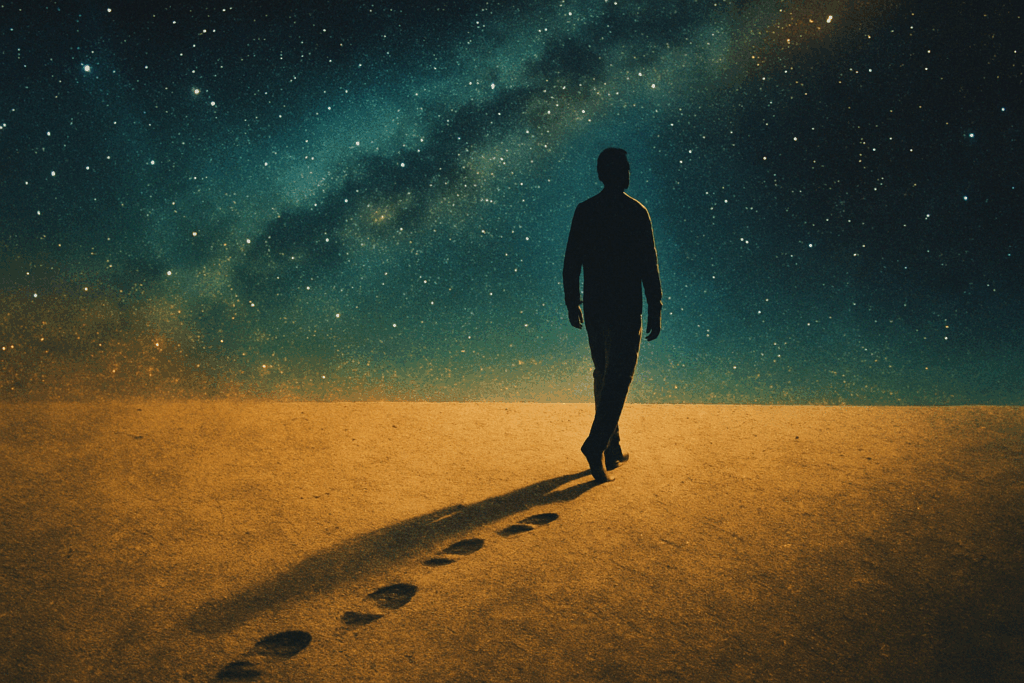The Island That Saw Him
He had felt the pull since he was a child.
Not a voice. Not a dream. Just a quiet gravity toward a place he’d never seen — an island in the northern Aegean Sea called Samothrace. A name that lived in the bones of his family, though not in their origin. His grandfather carried the surname Samothrakis, yet he came from Tinos, far to the south. It never made sense. It didn’t need to.
The pull was real. That was enough.
Years passed. Life moved. The feeling remained.
He was in his thirties when he finally went. A family trip, ordinary in every way — ferries, backpacks, dusty roads. No spiritual quest. No sacred map. Just a man answering a call he couldn’t explain.
They visited the ancient sanctuary of the Great Gods late in the afternoon. The Kaveirian Mysteries — secret rites whispered about through time, their purpose lost to history but never quite to memory — had once been performed there. People had come from across the ancient world, not to worship, but to transform.
Now, only the stones remained.
He walked the ruins slowly. Quietly. The sun hovered low, golden light turning the marble warm and soft. The others chatted, took photos, wandered ahead. He stayed behind. Watching. Listening.
As they left — early evening now, with darkness gathering in the folds of the mountains — something passed through him.
No shape. No sound.
Just a presence.
A moment of stillness that didn’t feel empty, but full. As if the land itself had exhaled, and he had been standing in the breath. Not a message. Not a miracle.
Just contact.
He turned to his wife and asked, “Did you feel that?”
She blinked. “Feel what?”
He nodded. “Nothing.”
She was grounded — always had been. Steady. Kind. Real. She didn’t chase shadows, didn’t follow whispers in the dusk. And he loved her for it.
But she didn’t feel it.
He did.
And that was enough.
He didn’t need to understand it. He didn’t need a name.
The island had spoken in silence, and he had heard.
…He didn’t speak of it again that night. He walked in silence, the gravel crunching beneath their shoes, dusk folding gently into night. The cicadas quieted. The wind shifted. The moment passed.
But it stayed with him.
In the days that followed, he tried to put words to it — not for others, but for himself. To trap the feeling in language. He couldn’t. Every time he reached for it, it slipped through. Like mist. Like breath.
Still, the island had said something. Not in words. Not even in thought.
In recognition.
It had seen him.
Not the way a place sees tourists. Not as a name on a ferry ticket or a footprint in dust. It had seen something older in him — a pattern, a rhythm, an echo that matched its own.
It didn’t tell him why he had been pulled here, or what the Mysteries meant. It didn’t offer enlightenment or purpose.
It offered a mirror.
It said: You are part of something that remembers.
Not memory as the mind holds it. But memory in stone. In root. In silence. A remembering that runs beneath time, deeper than language.
And for one heartbeat — just one — he was not a man walking through ruins.
He was the echo of every footstep that had come before him. The breath of every prayer. The stillness after every answerless question. One more presence in a lineage of seekers who didn’t need to know why — only that they were drawn, and that they came.
That was what the island said.
You are not the first to listen. You will not be the last.
And in that… was peace.
The White Presence
The road curved like a question through the dark mountains of Orini Nafpaktia.
It was night — the kind of night that swallows light. No streetlamps, no signs, no reflections. Just dirt beneath the tires, forest rising on all sides, and a silence older than language.
He drove carefully, eyes fixed ahead. His family slept around him, the weight of dreams soft in the car. He didn’t think much. He didn’t drift. In places like this, you stay grounded. You don’t ask questions.
And then — it came.
Not in front. Not in a scream. Just beside.
A figure, no — not a figure. An object. White. Moving. Passing the edge of his sight like a ripple through something too still.
No face. No sound. No intent.
Not human.
Not threat.
Just… there.
He felt the cold rise, not through temperature, but through knowing. The same way you feel when something brushes your soul without touching skin. No fear. No story. Just the deep animal knowing that something had moved where nothing should move.
He kept driving. Hands firm. Breath held.
And then: “Did you see that?”
His wife stirred. “See what?”
Nothing, apparently.
But he knew what he saw.
Not a ghost. Not a dream. Not a sign.
It was it.
An object in white, passing through limbo. Unnamed. Untouched. Unrepeatable.
It did not belong to the forest or the world. It did not belong to anything.
It was.
And that was all.
It didn’t return to him in dreams.
It returned in questions.
The kind that don’t look like questions at first. The kind that sound like, “Are we part of something bigger?” The kind that begin with astrophysics and end in silence. The kind that start as curiosity and become a doorway.
He had been speaking aloud — not to anyone, not even to himself, but to the dark fabric that sometimes listens back.
He had wondered aloud if matter and energy, light and shadow, all formed a single body. If what we call distance was just a trick of scale. If we are not on something, but inside it — an eye, a pulse, a dream folded into flesh.
And as he spoke of this, something stirred in him.
Not an idea.
A memory.
He hadn’t thought of that night in years. Hadn’t placed it anywhere in his understanding of the universe. It was just a thing that happened. A page left unturned.
But now, as he traced the invisible threads between atoms and stars — the memory rose.
The road. The dirt. The forest pressing in.
The white object, passing beside him, untouched by headlights, untouched by reason.
He saw it again — not just with his eyes, but with the part of him that had always known it was more than a flicker. It was a contact point. A collision of inner and outer worlds.
He realized then — this memory hadn’t been lost.
It had been waiting.
Waiting for him to dig deep enough. To follow the cosmic fabric far enough inward that it touched the place where mystery had once entered him without asking.
The object in white had no message. No identity. It was.
And now, so was he — not seeking answers, not building belief — just witnessing the fullness of a moment that had always been part of the pattern.
What if, he thought, the questions we ask shape the memories we find?
And what if those memories — silent, raw, untamed — are the real answers?
He didn’t know.
But he remembered.
And the remembering was the answer.
The Chapel and the Core
High above Loutraki, at the edge of stone and sea, there was a chapel. Old and silent, the kind of place built by hands who understood that holiness isn’t created — it’s recognized.
He was there with his wife and another couple — not close friends, just people whose lives had crossed paths. The visit was casual. The sky was clear. No expectations, no weight.
Outside the chapel, resting near the wall, were the remnants of ritual. Objects once used, now forgotten. Left behind or laid down. Quiet. Still.
He looked at them and felt nothing strange — only that they did not belong to him. Not in the legal sense. In the existential sense. They were not his to move.
But the others didn’t see it that way. They nudged and joked, and eventually convinced his wife to take half of them. She smiled. They smiled. It was harmless, they said.
He said nothing.
Not out of fear. Not out of passivity.
He said nothing because inside him, something had locked.
The moment those objects entered their space, his entire being pushed back. Not with fear. With truth.
Do not touch them.
Not because they were cursed. Because touching them would betray something deeper.
Not the place.
Himself.
What he felt wasn’t danger. It was disalignment. A breaking from the grain of his own values — of who he was, and who he had always been.
It was a misstep away from his core metal — the silent compass that had guided him through all his life’s quiet decisions.
He never touched them.
And to this day, he doesn’t know where they are.
But it doesn’t matter.
Because what he carried away wasn’t an object.
It was a moment of remembering — of holding the line, even when no one else saw the line was there.
The Echo of All Others
There were others, too.
No visions. No moments of fear. No singular presence passing through the corner of his eye.
Just the quiet.
The kind that settles into places where people have prayed — not loudly, not for show — but with trembling, with longing, with hope. With truth.
He didn’t need to know the prayers.
He didn’t need to know the gods.
He simply stepped into those places and felt the weight of all who had come before.
A chapel standing alone on the edge of Lake Doxa, its stone walls holding the silence of every hand once pressed in devotion. The water still, like time had chosen to stay a little longer.
A cave in Varkos, where a makeshift chapel clung to the cliff — not grand, not polished, but alive with memory. He had walked in, and his body knew: this was a place where knees had bent and eyes had closed, asking for something. Anything.
A temple in Little India, Bahrain, bright with color and movement. Different names, different language, different rhythm — but the same human breath. The same echo of reaching upward, inward, beyond.
And he felt it.
Not because he believed.
Because he listened.
Because these places are not just sacred for what they were built for — but for what they still hold.
The imprint of hands.
The tremble of hope.
The soft hum of presence.
And in each, he recognized the same thing he felt in Samothrace, on the forest road, at the edge of the chapel wall.
Not a mystery.
A memory.
Shared. Woven. Human.
He knows now: the thread does not end. It loops back, through stone and silence, through places where people once whispered please or thank you or help or just stay with me a little longer.
And all he ever did was show up.
Present. Open.
And feel the echoes.
Not to possess them.
Just to remember:
I was here.
You were, too.
We are not alone.






